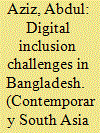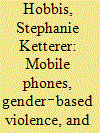| Srl | Item |
| 1 |
ID:
176576


|
|
|
|
|
| Summary/Abstract |
This study assesses the impact and effectiveness of the National Information and Communications Technology Policy (NIP) in Bangladesh, which is a key legal framework for ‘Vision 2021’ and ‘Digital Bangladesh’. It investigates the extent to which digital inclusion can be achieved by the NIP strategies, as well as exploring the conceptualisation of digital inclusion, which undergirds the contemporary debate on the digital divide and inclusion. The study employs a qualitative approach using policy goal-means analysis to explore critical scrutiny of the internal rationality and logic of the NIP based on three distinct criteria of the digital inclusion analytical framework: ICT access, use and skills. The analysis argues that the policy is ambiguous and techno-centric, with a narrow digitisation frame of reference, which does not comprehensively address the issues associated with digital inclusion. Policy needs to be consistent and relevant to a person’s daily life, giving the user a sense of empowerment and skill. The article concludes that a focus on a skill-based approach and the context of societal challenges of Bangladesh is crucial to ensuring digital inclusion.
|
|
|
|
|
|
|
|
|
|
|
|
|
|
|
|
| 2 |
ID:
161586


|
|
|
|
|
| Summary/Abstract |
This paper examines the potential benefits and pitfalls of mobile phones for accessing social services, particularly in response to gender‐based violence, in Solomon Islands and Papua New Guinea. Drawing on 13 months of ethnographic field research, I show how mobile phones increase rather than decrease perceived distances between social service providers and those they intend to serve. Mobile phones exaggerate the visibility of the shortcomings of the Solomon Islands and Papua New Guinea states and solidify an already entrenched distrust in the state and state services. This distrust is accentuated in experiences with mobile phone‐based mediations of gender‐based violence. Despite the positive influences of mobile phones, they are also recognised as conduits of violence. As such, mobile phones are not only morally ambivalent technologies but also, at times, actively disliked and their use discouraged. This challenges the optimism that surrounds many information and communication technologies for development (ICT4D) projects. When assessing the potentials, successes, and failures of ICT4D programmes, there is a need to pay more attention to the consequences of ‘negative’ or ‘unreliable’ usages of mobile phones as relational technologies.
|
|
|
|
|
|
|
|
|
|
|
|
|
|
|
|